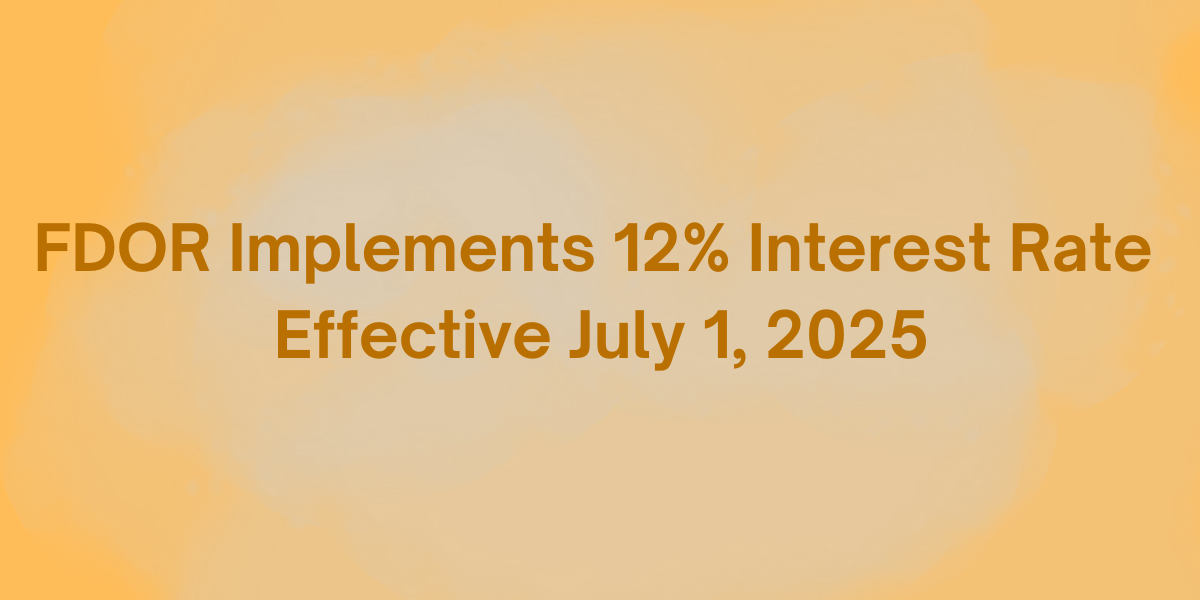NEWS & INSIGHTS


Florida Tax Interest Rate Set at 12% for Late Payments Through December 2025
If your business owes taxes to the Florida Department of Revenue (FDOR), you could face a hefty interest charge. According to TIP #25ADM-01, Florida’s interest rate on tax underpayments and late payments remains at 12% annually from July 1 through December 31, 2025. This elevated rate affects sales tax, corporate income tax, reemployment tax, and virtually every state-administered tax.
Whether you’re filing late, underpaid during an audit, or entering into a settlement or protest agreement, the interest can pile up quickly. Here’s what Florida businesses need to know.
What Is the Florida Tax Interest Rate?
Florida law requires the Department of Revenue to adjust its statutory interest rate for delinquent tax payments twice per year—on January 1 and July 1. These changes are based on market conditions, including federal short-term interest rates and economic activity.
Effective July 1, 2025 through December 31, 2025, the interest rate remains:
- 12% annual rate
- 1% per month
This applies to all taxes administered by FDOR, including:
- Sales and use tax
- Corporate income tax
- Communication services tax
- Documentary stamp tax
- Fuel tax
- Gross receipts tax
- Insurance premium tax
- Reemployment tax
Why Is 12% So High?
The interest rate is driven by market conditions and calculated per Section 213.235, Florida Statutes, which ties the interest to the federal short-term rate plus a statutory spread. The goal is to incentivize timely compliance and reflect the cost to the state of unpaid liabilities.
Historically, Florida’s interest rate hovered between 6%–9%, but recent inflation and rising federal rates have pushed it significantly higher.
How Much Could This Cost You? (Examples)
Example 1: Late Sales Tax Payment
You forget to file your March 2025 sales tax return and pay $10,000 two months late.
Interest: $10,000 × 1% × 2 months = $200 interest
Example 2: Underpayment Found in Audit
During a 2025 audit, the FDOR finds your business underpaid sales tax by $75,000, and it’s been 9 months since the original due date.
Interest: $75,000 × 1% × 9 = $6,750 interest
Example 3: Voluntary Disclosure Agreement
You voluntarily disclose an error for unpaid reemployment taxes totaling $5,000 from one year ago.
Interest: $5,000 × 12% = $600 interest
Who Pays Interest and When?
Interest is imposed on:
- Late returns
- Partial payments
- Deficiencies uncovered in audit
- Settlements and negotiated liabilities
- Final assessments even if protested
Unlike penalties, interest is never waived unless there’s a clear Department error.
Can You Avoid or Reduce Interest?
While interest is almost never forgiven, you can:
- Avoid interest entirely by filing and paying on time
- Request a payment plan to stop additional accrual (though interest continues until full payment)
- Settle early if under audit to minimize how long interest accrues
- File accurate and timely returns even if you can’t pay — you’ll avoid late-filing penalties
FDOR Interest Rate History (Quick Snapshot)
| Period | Annual Rate |
|---|---|
| Jan–Jun 2024 | 11% |
| Jul–Dec 2024 | 12% |
| Jan–Jun 2025 | 12% |
| Jul–Dec 2025 | 12% |
Stay Informed on Florida Tax Policy
Subscribe to The SALTy Orange, our Florida state and local tax newsletter, or visit MoffaTaxLaw.com for updates on sales tax audits, interest rates, penalty trends, and more.
© 2025 Jeanette Moffa. All Rights Reserved.
Share
Additional Articles by the SALTy Orange at Moffa Tax Law:
Florida Repeals Sales Tax on Commercial Rent — Will DeSantis Sign the Landmark 2025 Tax Cut?
NEWS & INSIGHTS Florida Repeals Sales Tax on Commercial Rent — Will DeSantis Sign the Landmark 2025 Tax Cut? …
NEWS & INSIGHTS Is Bottled Coffee Subject to Florida Sales Tax? The Answer May Surprise You Is Bottled Coffee Subject…
Inside the ABA SALT Committee Meeting: What Tax Professionals Need to Know About the Annual May Conference in D.C.
NEWS & INSIGHTS Inside the ABA SALT Committee Meeting: What Tax Professionals Need to Know About the Annual May Conference…

Jeanette Moffa, Esq.
(954) 800-4138
JeanetteMoffa@MoffaTaxLaw.com
Jeanette Moffa is a Partner in the Fort Lauderdale office of Moffa, Sutton, & Donnini. She focuses her practice in Florida state and local tax. Jeanette provides SALT planning and consulting as part of her practice, addressing issues such as nexus and taxability, including exemptions, inclusions, and exclusions of transactions from the tax base. In addition, she handles tax controversy, working with state and local agencies in resolution of assessment and refund cases. She also litigates state and local tax and administrative law issues.


